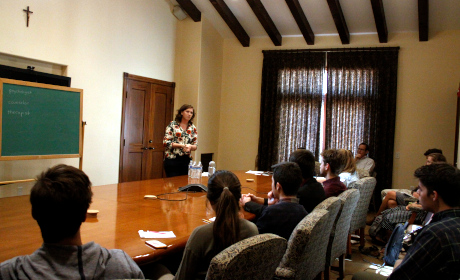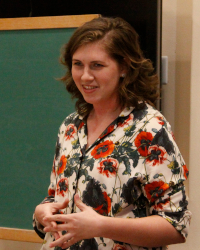- Home
-
About
 Fidelity & Excellence
Fidelity & ExcellenceThomas Aquinas College is unique among American colleges and universities, offering a faithfully Catholic education comprised entirely of the Great Books and classroom discussions.
-
A Liberating Education
 Truth Matters
Truth MattersTruth, and nothing less, sets men free; and because truth is both natural and supernatural, the College’s curriculum aims at both natural and divine wisdom.
-
A Catholic Life
 Under the Light of Faith
Under the Light of FaithThe intellectual tradition and moral teachings of the Catholic Church infuse the whole life of Thomas Aquinas College, illuminating the curriculum and the community alike.
-
Admission & Aid
 Is TAC Right for You?
Is TAC Right for You?Do you enjoy grappling with complex questions? Are you willing to engage in discussions about difficult concepts, with the truth as your ultimate goal?
-
Students & Parents
 Mind, Body & Spirit
Mind, Body & SpiritThere is always something to do at TAC — something worthwhile, something fulfilling, and something geared toward ever-greater spiritual and intellectual growth.
-
Alumni & Careers
 What Can You Do with a Liberal Education?
What Can You Do with a Liberal Education?Nothing speaks more to the versatility of the College’s academic program than the good that our alumni are doing throughout the Church and the world.
- Search
- Giving
Alumna Therapist to TAC Students: “We Need You”
“We need ethical therapists, and this is why I have come to talk to you today,” Marietta Grumbine (’14) told a group of Thomas Aquinas College, California, students last week at a talk about psychology and counseling, sponsored by the Office of Career Services. “I have been where you are, and I know the formation that you have had. We need you.”
In the last year of a three-year Marriage and Family Therapy master’s program at Fuller Theological Seminary, Miss Grumbine is a counseling intern at the Phoenix Rescue Mission, a homeless shelter and addiction-recovery center where, she reports, she is blessed to perform daily three Spiritual Works of Mercy — “counseling the doubtful, comforting the afflicted or the sorrowful, and instructing the ignorant.”
The work of a therapist, however, “is not pretty, it’s not glamorous, and it’s heartbreaking sometimes,” Miss Grumbine cautioned. “Being a therapist is looking at all those things no one wants to look at — trauma, abuse, neglect, addiction — no one wants to look at those things. No one wants to look down and help. But we were told to do that. We were told to wash one another’s feet. We were told to look at the ugly things and serve. Being a therapist is that. It’s being a foot-washer.”
But it’s not for everyone. “Being a therapist is a calling, and I really want to stress that,” she continued. “If you’re still sitting here, hearing this talk, and if you have heard everything that I have to say about what therapy is really like, and what being a therapist is really like, and you are still interested … then you might be called to it.”
In the course of her hour-long presentation, “Beyond the Couch: Counseling and Clinical Psychology,” Miss Grumbine answered students questions about graduate-school options, various kinds of therapeutic practice, and the ethical challenges that a Catholic therapist may encounter. “You need to know what you believe,” she said, “and how you’re going to act on it.”
Counseling, she continued, serves an essential human need. “Everyone needs mental-health care, because we are human beings, just as everyone needs to be taken care of physically sometimes,” she explained. Because clients are often vulnerable, and the information they disclose can expose them to exploitation and manipulation, therapists must possess the highest ethical standards.
“There is a lot of beautiful work that can be done in therapy,” Miss Grumbine said. “But in order to do that work, you need to be trustworthy with people’s lives in your hands. That’s why I’m talking to you, because I’m hoping that you are those people, and I want to convince you to go be therapists.”



